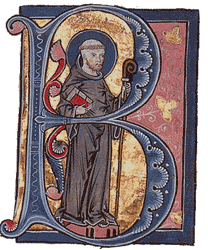“You lived, O man, in darkness and the shadow of death through ignorance of the truth; you were a prisoner and your sins were your shackles. He [Jesus] came down to you in your prison, not to torture you but to liberate you from the power of darkness. And first of all, as the Teacher of Truth, he banished the murk of your ignorance by the light of his wisdom. By ‘the righteousness that comes of faith’ (Rom. 9:30) he loosed the bonds of sin, justifying the sinners by his free gift. Furthermore, by living holily in the midst of sinners he laid down a pattern of life that is pathway back to the fatherland.” Bernard of Clairvaux, Sermon 22, On the Song of Songs II, trans. Kilian Walsh (Kalamazoo: Cistercian, 1983), p. 19. 
In this sermon from Bernard’s series on the Song of Songs, we may observe his preaching on the redemption of sinful humanity by the incarnate Christ. Here he explained to his fellow monks (and later readers) that Jesus came to free human beings from the chains of sin through the gift of righteousness received by faith. However, notice Bernard explained that Christ had demonstrated the sanctified way of living based on love. He continued:
“As a gesture of love he surrendered himself to death and from his own side produced the price of satisfaction that would placate his Father, thus clearly making his own the verse: ‘It is with the Lord that mercy is to be found, and a generous redemption.’* Utterly generous, for not a mere drop but a wave of blood flowed unchecked from the five wounds of his body.” Ibid. [Emphasis added]
Bernard uses the image of satisfaction of the Father’s honor here derived from Anselm of Canterbury’s teaching on redemption. In the twelfth century, preachers, such as Bernard, used this image of satisfaction and also the idea the ransom theory. This is the idea that Christ redeemed sinful humanity from the power of the devil, sin, and death through His crucifixion, death, and resurrection. Notice also Bernard’s graphic description of Christ’s Passion and bloody wounds. He often connected his theology of redemption with meditation on this Passion that so greatly shaped late medieval religious devotion.
*Psalm 129:7 (Vulgate)
